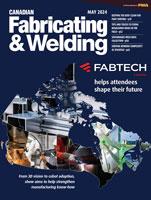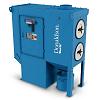Editor
- FMA
- The Fabricator
- FABTECH
- Canadian Metalworking
Building better teams through membership
How individuals and companies can use FMA membership to strengthen shop skill sets
- By Rob Colman
- November 5, 2021
Finding good people for a fabricating business is a challenge in any economy. As much as every company wants employees to arrive with all the skill sets they need to do the job, many are finding that it’s necessary to train new recruits from the ground up.
For instance, an unskilled person might be hired to run the smallest, most automated press brake on the shop floor and then be trained to operate older, less intuitive brakes. Likewise, an employee might be hired initially to load parts into fixtures for automated welding processes, and gradually get trained for related tasks.
This is one area where companies can benefit from a Fabricators & Manufacturers Association International (FMA) membership. FMA is the parent company of Canadian Fabricating & Welding, and we rarely write directly about how the organization can help our Canadian readers. But it’s worth considering how some of its resources can help change your business for the better. I sat down with Pat Simon, FMA’s director of member services and education, to learn about some of the key resources members can access.
Canadian Fabricating & Welding: Pat, what’s the No. 1 thing people get enthusiastic about when you ask them about their FMA membership?
Pat Simon: It’s the networking opportunities – something we’ve really missed out on over the past year. But with a return to in-person events, we’re really looking forward to those opportunities coming back with FABTECH Chicago in September and our 13th annual Safety Conference in October. Our virtual FMA annual meeting, The Fabrication & Metals Industries’ Leadership Conference, was quite successful this year, but we are looking forward to being back in person with everyone in 2022.
CFW: For a lot of people, networking also means giving back to the community. How does being a member support the development of the industry?
PS: This is very important to our members because it’s through this outreach we find future industry leaders. Through Nuts, Bolts and Thingamajigs, our charitable foundation, we raise money for scholarships that help students focused on manufacturing-related subjects attend university and college programs. We also support manufacturing-related camps where grade-school students get a chance to better understand how a career in the industry might suit them. Over the coming year we are really working to develop these opportunities more across Canada.
CFW: I think that’s important to our Canadian readers – how FMA can make a difference in their communities. While the organization works to boost manufacturing camps and encourage Canadian students to apply for its scholarships, what’s available right now on the website for members?
PS: Yes, I think a lot of our resources can help companies right now in their drive to better educate new hires. For instance, business-level members can get access to all of our online education curriculum, which can be very useful for human resources departments. The curriculum has a learning management system, which includes modules such as an introduction to blueprint reading, basic metal shop mathematics, and a pre-employment assessment tool for fabricators. An HR person could benefit from those resources, either through pre-employment aptitude testing or to help train team members once they are hired.
Membership also gets you discounts on in-class courses and entrance to events like the Leadership Conference to further your networking and classroom opportunities. All this comes at a very reasonable cost compared to many association memberships.
CFW: It seems like a lot of educational resources are focused on entry-level skills. Why did FMA decide to make that its main goal?
PS: Indications from the market are that this is where the need is greatest. And, again, it’s about developing the industry, creating cornerstones that companies can build from. It’s a key place we can make a difference. Our Press Brake 101 course, which can be taken in person or online, is another example of introductory knowledge that shops need to build up their press brake departments of the future.
CFW: FMA doesn’t do this alone, of course. Lots of companies and other associations are working to improve and expand manufacturing in North America. How are you working with these organizations?
PS: The biggest joint venture we have, of course, is FABTECH, which is hosted by a group of like-minded organizations. But beyond that we are always looking to find partners that can help better our members. For instance, we recently partnered with CWB in Canada to offer six of its courses online, which our members can purchase at a discount.
In terms of safety management, we have a partnership with Safety PLR, a third-party website safety service. As an individual company, the resources it offers would cost more than $8,000 to access, but as an FMA member, you can access this library of safety resources without additional costs.
On a more basic level, membership can get you discounts with car rental and freight companies, among others. These are by no means central concerns for members, but they are nice perks to have.
CFW: What do you think it means to be a part of an association like FMA?
PS: Honestly, it’s about being part of a tight-knit community. You are among your peers and can benefit from the connections you make. As a member of the association, you are giving back while gaining access to resources that can help push your company forward.
Editor Robert Colman can be reached at rcolman@canadianfabweld.com.
Fabricators & Manufacturers Association membership page, www.fmamfg.org/membership
subscribe now


Keep up to date with the latest news, events, and technology for all things metal from our pair of monthly magazines written specifically for Canadian manufacturers!
Start Your Free SubscriptionAbout the Author

Rob Colman
1154 Warden Avenue
Toronto, M1R 0A1 Canada
905-235-0471
Robert Colman has worked as a writer and editor for more than 25 years, covering the needs of a variety of trades. He has been dedicated to the metalworking industry for the past 13 years, serving as editor for Metalworking Production & Purchasing (MP&P) and, since January 2016, the editor of Canadian Fabricating & Welding. He graduated with a B.A. degree from McGill University and a Master’s degree from UBC.
- Industry Events
Automate 2024
- May 6 - 9, 2024
- Chicago, IL
ANCA Open House
- May 7 - 8, 2024
- Wixom, MI
17th annual Joint Open House
- May 8 - 9, 2024
- Oakville and Mississauga, ON Canada
MME Saskatoon
- May 28, 2024
- Saskatoon, SK Canada
CME's Health & Safety Symposium for Manufacturers
- May 29, 2024
- Mississauga, ON Canada





















